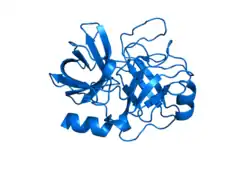KLK8
Kallikrein-8 is a protein that in humans is encoded by the KLK8 gene.[5][6][7][8][9]
Kallikreins are a subgroup of serine proteases having diverse physiological functions. Growing evidence suggests that many kallikreins are implicated in carcinogenesis and some have potential as novel cancer and other disease biomarkers. This gene is one of the fifteen kallikrein subfamily members located in a cluster on chromosome 19. Alternate splicing of this gene results in four transcript variants encoding four different isoforms. The isoforms exhibit distinct patterns of expression that suggest roles in brain plasticity and ovarian cancer.[9]
References
- GRCh38: Ensembl release 89: ENSG00000129455 - Ensembl, May 2017
- GRCm38: Ensembl release 89: ENSMUSG00000064023 - Ensembl, May 2017
- "Human PubMed Reference:". National Center for Biotechnology Information, U.S. National Library of Medicine.
- "Mouse PubMed Reference:". National Center for Biotechnology Information, U.S. National Library of Medicine.
- Mitsui S, Tsuruoka N, Yamashiro K, Nakazato H, Yamaguchi N (May 1999). "A novel form of human neuropsin, a brain-related serine protease, is generated by alternative splicing and is expressed preferentially in human adult brain". Eur J Biochem. 260 (3): 627–34. doi:10.1046/j.1432-1327.1999.00213.x. PMID 10102990.
- Yoshida S, Taniguchi M, Hirata A, Shiosaka S (Aug 1998). "Sequence analysis and expression of human neuropsin cDNA and gene". Gene. 213 (1–2): 9–16. doi:10.1016/S0378-1119(98)00232-7. PMID 9714609.
- Lundwall A, Band V, Blaber M, Clements JA, Courty Y, Diamandis EP, Fritz H, Lilja H, Malm J, Maltais LJ, Olsson AY, Petraki C, Scorilas A, Sotiropoulou G, Stenman UH, Stephan C, Talieri M, Yousef GM (Jun 2006). "A comprehensive nomenclature for serine proteases with homology to tissue kallikreins". Biol Chem. 387 (6): 637–41. doi:10.1515/BC.2006.082. PMID 16800724. S2CID 436200.
- Diamandis, Eleftherios P.; Deperthes, David; Lundwall, Åke (Jun 2006). "Proceedings of the 1st International Symposium on Kallikreins, Lausanne, Switzerland, September 1-3 , 2005". Biol Chem. 387 (6): 635–824. doi:10.1515/BC.2006.081. PMID 16800723. S2CID 83910246.
- "Entrez Gene: KLK8 kallikrein-related peptidase 8".
Further reading
- Underwood LJ, Tanimoto H, Wang Y, et al. (1999). "Cloning of tumor-associated differentially expressed gene-14, a novel serine protease overexpressed by ovarian carcinoma". Cancer Res. 59 (17): 4435–9. PMID 10485494.
- Harvey TJ, Hooper JD, Myers SA, et al. (2001). "Tissue-specific expression patterns and fine mapping of the human kallikrein (KLK) locus on proximal 19q13.4". J. Biol. Chem. 275 (48): 37397–406. doi:10.1074/jbc.M004525200. PMID 10969073.
- Gan L, Lee I, Smith R, et al. (2001). "Sequencing and expression analysis of the serine protease gene cluster located in chromosome 19q13 region". Gene. 257 (1): 119–30. doi:10.1016/S0378-1119(00)00382-6. PMID 11054574.
- Magklara A, Scorilas A, Katsaros D, et al. (2001). "The human KLK8 (neuropsin/ovasin) gene: identification of two novel splice variants and its prognostic value in ovarian cancer". Clin. Cancer Res. 7 (4): 806–11. PMID 11309326.
- Strausberg RL, Feingold EA, Grouse LH, et al. (2003). "Generation and initial analysis of more than 15,000 full-length human and mouse cDNA sequences". Proc. Natl. Acad. Sci. U.S.A. 99 (26): 16899–903. doi:10.1073/pnas.242603899. PMC 139241. PMID 12477932.
- Clark HF, Gurney AL, Abaya E, et al. (2003). "The Secreted Protein Discovery Initiative (SPDI), a Large-Scale Effort to Identify Novel Human Secreted and Transmembrane Proteins: A Bioinformatics Assessment". Genome Res. 13 (10): 2265–70. doi:10.1101/gr.1293003. PMC 403697. PMID 12975309.
- Cané S, Bignotti E, Bellone S, et al. (2004). "The novel serine protease tumor-associated differentially expressed gene-14 (KLK8/Neuropsin/Ovasin) is highly overexpressed in cervical cancer". Am. J. Obstet. Gynecol. 190 (1): 60–6. doi:10.1016/j.ajog.2003.07.020. PMID 14749636.
- Grimwood J, Gordon LA, Olsen A, et al. (2004). "The DNA sequence and biology of human chromosome 19". Nature. 428 (6982): 529–35. doi:10.1038/nature02399. PMID 15057824.
- Shigemasa K, Tian X, Gu L, et al. (2004). "Human kallikrein 8 (hK8/TADG-14) expression is associated with an early clinical stage and favorable prognosis in ovarian cancer". Oncol. Rep. 11 (6): 1153–9. doi:10.3892/or.11.6.1153. PMID 15138549.
- Li Y, Qian YP, Yu XJ, et al. (2005). "Recent origin of a hominoid-specific splice form of neuropsin, a gene involved in learning and memory". Mol. Biol. Evol. 21 (11): 2111–5. doi:10.1093/molbev/msh220. PMID 15282331.
- Rajapakse S, Ogiwara K, Takano N, et al. (2006). "Biochemical characterization of human kallikrein 8 and its possible involvement in the degradation of extracellular matrix proteins". FEBS Lett. 579 (30): 6879–84. doi:10.1016/j.febslet.2005.11.039. hdl:2115/985. PMID 16337200. S2CID 22439153.
- Kishi T, Cloutier SM, Kündig C, et al. (2006). "Activation and enzymatic characterization of recombinant human kallikrein 8" (PDF). Biol. Chem. 387 (6): 723–31. doi:10.1515/BC.2006.091. PMID 16800733. S2CID 19299456.
- Sher YP, Chou CC, Chou RH, et al. (2007). "Human kallikrein 8 protease confers a favorable clinical outcome in non-small cell lung cancer by suppressing tumor cell invasiveness". Cancer Res. 66 (24): 11763–70. doi:10.1158/0008-5472.CAN-06-3165. PMID 17178872.
- Lu ZX, Peng J, Su B (2007). "A human-specific mutation leads to the origin of a novel splice form of neuropsin (KLK8), a gene involved in learning and memory". Hum. Mutat. 28 (10): 978–84. doi:10.1002/humu.20547. PMID 17487847. S2CID 6001199.
This article is issued from Wikipedia. The text is licensed under Creative Commons - Attribution - Sharealike. Additional terms may apply for the media files.




